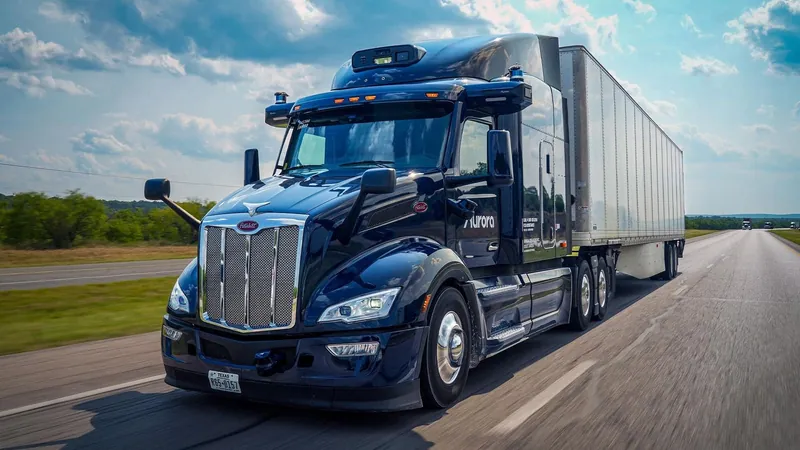
The Dawn of Autonomous Trucking: Aurora Prepares to Launch Driverless Operations
2025-01-21
Author: Kai
As the self-driving vehicle landscape evolves, Aurora Innovation is gearing up for a significant milestone—its driverless trucks are set to hit the road as early as April. This comes after a turbulent month for the company's stock and a broader industry context where numerous autonomous vehicle firms have succumbed to challenges. Aurora's CEO, Chris Urmson, who previously led Google's self-driving initiatives, believes the company is on the brink of commercializing autonomous trucking, even though it may take years before profitability is realized.
In a sector marked by failed ventures—such as GM's Cruise and Uber's self-driving tech unit—Aurora has managed to remain afloat since its founding in 2017. It is currently the last major publicly traded U.S. company focused solely on autonomous vehicles. The company, however, has encountered significant delays in launching its driverless trucking services, which Urmson insists will not be prolonged any further.
The initial rollout will involve a single semi-truck making deliveries between Dallas and Houston, with ambitions to operate multiple trucks on additional routes by the year's end. Aurora's chosen method aims for careful scaling, understanding the complexities of developing reliable autonomous trucking systems in an industry that is historically low-margin yet worth trillions of dollars globally.
A vital element in Aurora's endeavor includes navigating relationships with freight companies and truck manufacturers. The challenge is steep, especially given the ongoing driver shortage within the trucking industry. Notable projections suggest that the autonomous trucking market could reach an astounding $600 billion by the mid-2030s, given the right technological advancements and successful commercialization.
Traditionally viewed as easier than deploying robotaxis in urban environments, operating autonomous trucks still presents its own hurdles. High speeds on highways and the massive scale of 18-wheelers pose unique risks, especially during adverse weather conditions. Critics, including industry experts like George Mason University's Missy Cummings, caution about the unresolved technical challenges in achieving safe highway operations at high speeds.
Despite these hurdles, Aurora is investing heavily in research and development, with over $2.4 billion spent since 2020. The company's stock has also seen recent fluctuations, partly due to exciting tech partnerships with major players like Nvidia and Continental. Although share prices spiked earlier this month, they have since receded, reflecting investor sentiment's cautious optimism.
Currently, Aurora's pilot program includes partnerships with companies like FedEx and Uber Freight, indicating a strategic path to revenue generation. Interestingly, even though the launch of its commercial operations has taken longer than expected, Urmson remains confident that Aurora will ultimately be the first to successfully deploy driverless trucks at scale.
With a cache of over $1 billion in funding, Aurora is well-positioned to navigate the ups and downs of this competitive landscape. Nonetheless, it will need to maintain momentum and overcome the myriad technical challenges that lie ahead if it hopes to lead the charge toward a driverless future in trucking.
In an industry already transforming, the introduction of autonomous trucks could not only reshape transportation logistics but also generate substantial economic impacts. As the countdown to launch begins, all eyes are on Aurora to see if it can deliver on its promise and revolutionize the trucking sector. Will it be the breakthrough the industry has been waiting for, or just another false dawn?

 Brasil (PT)
Brasil (PT)
 Canada (EN)
Canada (EN)
 Chile (ES)
Chile (ES)
 Česko (CS)
Česko (CS)
 대한민국 (KO)
대한민국 (KO)
 España (ES)
España (ES)
 France (FR)
France (FR)
 Hong Kong (EN)
Hong Kong (EN)
 Italia (IT)
Italia (IT)
 日本 (JA)
日本 (JA)
 Magyarország (HU)
Magyarország (HU)
 Norge (NO)
Norge (NO)
 Polska (PL)
Polska (PL)
 Schweiz (DE)
Schweiz (DE)
 Singapore (EN)
Singapore (EN)
 Sverige (SV)
Sverige (SV)
 Suomi (FI)
Suomi (FI)
 Türkiye (TR)
Türkiye (TR)
 الإمارات العربية المتحدة (AR)
الإمارات العربية المتحدة (AR)